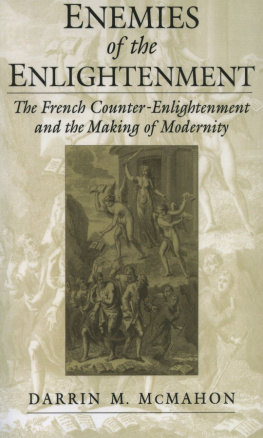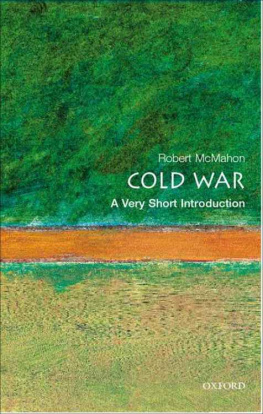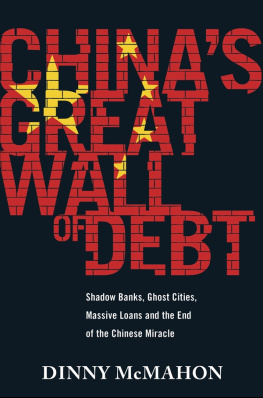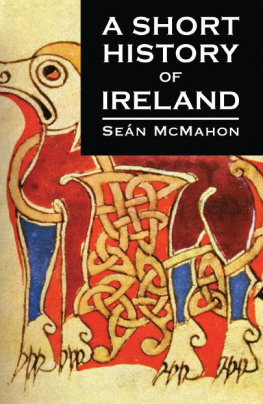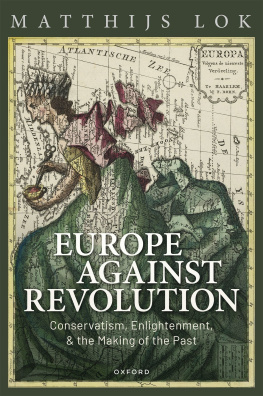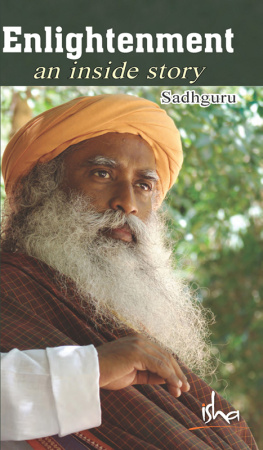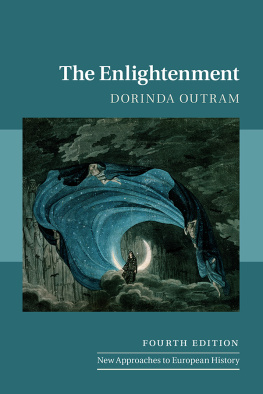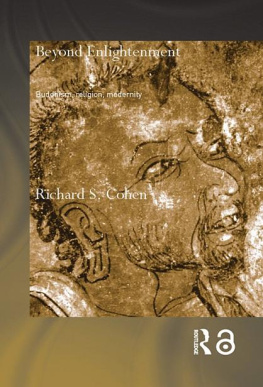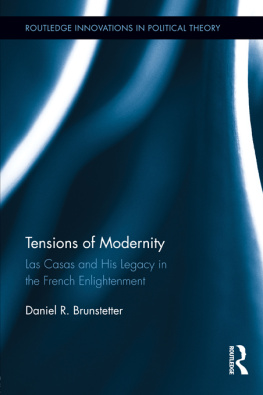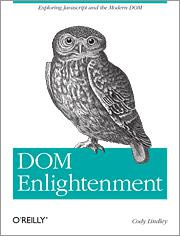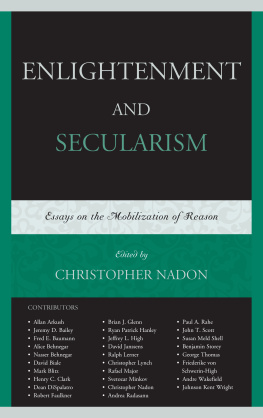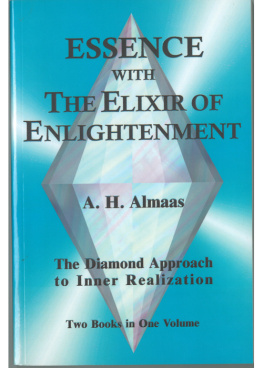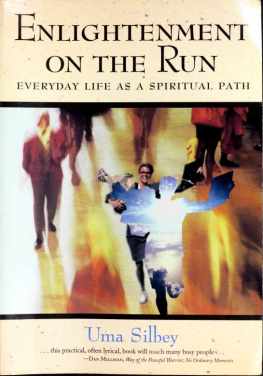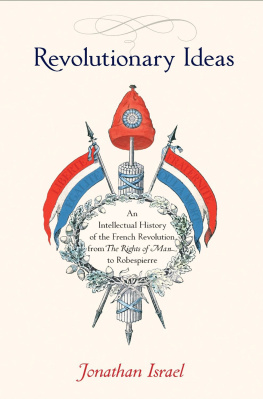McMahon - Enemies of the enlightenment: the French counter-enlightenment and the making of modernity
Here you can read online McMahon - Enemies of the enlightenment: the French counter-enlightenment and the making of modernity full text of the book (entire story) in english for free. Download pdf and epub, get meaning, cover and reviews about this ebook. City: USA;New York;France;Frankreich, year: 2002;2014, publisher: Oxford University Press, genre: Religion. Description of the work, (preface) as well as reviews are available. Best literature library LitArk.com created for fans of good reading and offers a wide selection of genres:
Romance novel
Science fiction
Adventure
Detective
Science
History
Home and family
Prose
Art
Politics
Computer
Non-fiction
Religion
Business
Children
Humor
Choose a favorite category and find really read worthwhile books. Enjoy immersion in the world of imagination, feel the emotions of the characters or learn something new for yourself, make an fascinating discovery.
Enemies of the enlightenment: the French counter-enlightenment and the making of modernity: summary, description and annotation
We offer to read an annotation, description, summary or preface (depends on what the author of the book "Enemies of the enlightenment: the French counter-enlightenment and the making of modernity" wrote himself). If you haven't found the necessary information about the book — write in the comments, we will try to find it.
Enemies of the enlightenment: the French counter-enlightenment and the making of modernity — read online for free the complete book (whole text) full work
Below is the text of the book, divided by pages. System saving the place of the last page read, allows you to conveniently read the book "Enemies of the enlightenment: the French counter-enlightenment and the making of modernity" online for free, without having to search again every time where you left off. Put a bookmark, and you can go to the page where you finished reading at any time.
Font size:
Interval:
Bookmark:

 of the
of theDarrin M. McMahon


Oxford New York
Auckland Bangkok Buenos Aires Cape Town Chennai .
Dar es Salaam Delhi Hong Kong Istanbul Karachi Kolkata
Kuala Lumpur Madrid Melbourne Mexico City Mumbai Nairobi
So Paulo Shanghai Singapore Taipei Tokyo Toronto
and an associated company in Berlin
Copyright 2001 by Darrin M. McMahon
Published by Oxford University Press, Inc.
198 Madison Avenue, New York, New York 10016
www.oup.com
First issued as an Oxford University Press paperback, 2002
Oxford is a registered trademark of Oxford University Press.
All rights reserved. No part of this publication may be reproduced, stored in a retrieval system, or transmitted, in any form or by any means, electronic, mechanical, photocopying, recording, or otherwise, without the prior permission of Oxford University Press.
Library of Congress Cataloging-in-Publication Data
McMahon, Darrin M.
Enemies of the enlightenment : the French counter-Enlightenment and the making of modernity / Darrin M. McMahon.
p. cm.
Includes bibliographical references and index.
ISBN 0-19-513685-3; 0-19-515893-8 (pbk.)
ebook ISBN 978-0-19-988129-1
I. Enlightenment. 2. Philosophy, French18th century. I. Title.
B1925.E5 M39 2000
944.04dc21 00-045297
9 8 7 6 5 4 3 2
Printed in the United States of America
on acid-free paper
TO MY MOTHER,
who taught me commitment and compassion, two values so necessary to the scholar.
AND TO MY FATHER,
who through childhood bedtime stories, and many since, showed me the worth of history as both soporific and the stuff of dreams.
The amused librarian in Paris who fielded my first, fumbling inquiries in 1994 about the material that would become this book greeted me, in turn, with a question of her own. Vous tes royaliste, monsieur? Delivered in a tone that only one who has spent time in French libraries will fully appreciate (a distinct blend of candor, civility, and condescension), the question took me somewhat by surprise. Admittedly, I was seeking information on royalists, and what is more, on royalists of a particular kind. Catholics, conservatives, counterrevolutionaries, the first ideologues of the Right, all promised to figure prominently in my proposed study of cultural opposition to the Enlightenment in the eighteenth and nineteenth centuries. But that this might imply some immediate identification with the subject matter at hand struck me as odd. An undistinguished heir to the Irish peasantry and a native son of California, I had never even known a royalist. Did such a thing actually still exist?
No doubt I took the question a little too seriously. I was, after all, guilty by association, or at least so it seemed. As the historically minded French never failed to observe, my last name bears a damning resemblance to that of the infamous Marchal MacMahon, a French general implicated in efforts to restore the monarchy during the Third Republic. There is, to my knowledge, no connection, but inquiries of a skeptical, even suspicious nature continued to follow me through France nonethelessboth in and out of the archives. Time and again I was asked to account for my subject, to explain why I had chosen to study what I had. Was I Catholic, a Counter-Revolutionary, an enemy of the Enlightenment, a man of the Right? Just what was I up to? For all the good-natured teasing in this interrogation, there was genuine suspicion as well. This fact is a subtle reminder of what the heated debates surrounding the revolutionary bicentennial of 1989 and the electoral successes of the extreme Right in the 1990s also emphasized: that neither the Enlightenment nor the Revolution is completely over in France. Both of these eighteenth-century upheavals continue to serve as benchmarks by which men and women gauge their allegiances and identity in the present. They still generate passion.
On European soil, then, my choice of topic retained the power to raise quizzical eyebrows. But across the Atlantic, a study of cultural opposition to the Enlightenment seemed, at least to me, perfectly innocuous. Moreover, it seemed timely, for Americans had just witnessed firsthand during the 1980s and early 1990s the disheartening spectacle of cultural divide. In what was perhaps the final flare-up of the implosion following the supernova of the 1960s, the American University became, once again, an important site in public consciousness, a key battlefield of what were termed the culture wars. Endlessly explicated in both the academic and the popular press, these wars, at their best, raised fundamental questions about the nature of American identity at the end of the twentieth century. At their worst, however, and all too often, they degenerated into mutual shouting matches in which pundits and polemicists threw mud at caricatures of their opponents, providing a perfect example of the way in which intellectual adversaries are wont to create their own enemies from straw. While cultural conservatives attacked the allegedly monolithic power of 1960s radicals, well ensconced and burrowing away in the nations media and universities, the Left countered with the fanatical specter of the Christian fundamentalist, puritanical, out of touch with modern America, but dangerously close to ruling it nonetheless. If there was truth in either claim, there was far more falsehood. But this didnt prevent the two sides from hurling insults past one another with ever-increasing ferocity. For all its remove from reality, this invective had very real consequences in the political landscape.
The Enlightenment was not always a divisive issue in these debates. In a strange twist, as I have occasion to discuss later, it even united the more extreme voices on the Right and Left in shared contempt. Yet the debates themselves, with their sharp, often artificial dichotomies between politically correct progressives and reactionary fundamentalists, did appear to offer insight into the dynamics of cultural cleavage and intellectual divide. Mindful of the dangers inherent in allowing the present to shape ones understanding of the past, I came to see genuine merit in conceiving of the eighteenth centurywith the French Enlightenment as its centerpieceas a culture war of its own. As I hope this book demonstrates, the parallels are revealing.
While American critics bashed each other in a native war over culture, developments on the world stage also suggested that a study of religious opposition to the Enlightenment might illuminate broader issues and concerns. As an employee at the Office of Programs in Comparative Religion at the Graduate Theological Union while I was an undergraduate at Berkeley and then as an analyst of religious nationalist movements at the United States Institute of Peace in 19901991, I watched as not only the United States but also Israel, India and Sri Lanka, much of the Middle East, the former Soviet Union, eastern Europe, Africa, and Latin America experienced what appeared to be a worldwide revival of religion or, at the very least, its strong resurgence in public life. Ironically, at the very time that Western philosophers were proclaiming the demise of grand narratives, religious or otherwise, as the end of ideology or the onset of the postmodern condition, religious activists around the world were making headlines and, at the same time, a mockery of the Enlightenment assumption that the darkness of fanaticism would naturally give way to the light of reason. Defying what sociologists and political theorists had long held to be the relentless logic of modernityincreasing secularization and an ever-widening gap between the sacred and the profanethe world at the end of the twentieth century suggested that the connection might be more complicated. There would be no better time than now, it seemed, to explore the origins of that very dividethe moment at which Western culture squared off into the hostile, suspicious camps of the secular and the sacred. This book seeks to tell an important chapter in that story.
Font size:
Interval:
Bookmark:
Similar books «Enemies of the enlightenment: the French counter-enlightenment and the making of modernity»
Look at similar books to Enemies of the enlightenment: the French counter-enlightenment and the making of modernity. We have selected literature similar in name and meaning in the hope of providing readers with more options to find new, interesting, not yet read works.
Discussion, reviews of the book Enemies of the enlightenment: the French counter-enlightenment and the making of modernity and just readers' own opinions. Leave your comments, write what you think about the work, its meaning or the main characters. Specify what exactly you liked and what you didn't like, and why you think so.

